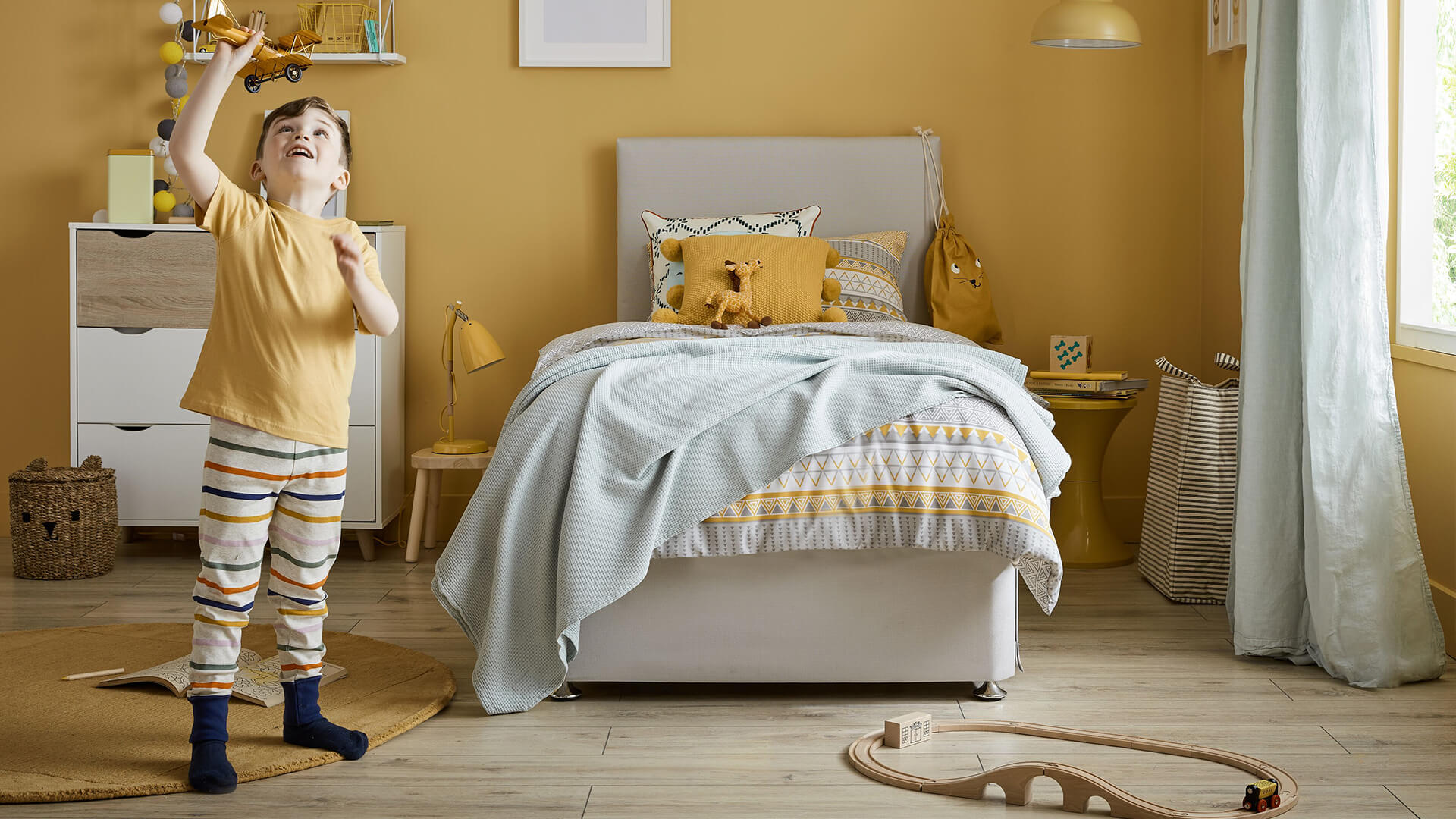Bath, Book & Bed: How to Get Your Children to Sleep | Sleep Hub
As many parents will already know, a regular bedtime routine is vital to making sure that your child gets plenty of good quality sleep. But as all parents also know, establishing one can be much easier said than done!
Nevertheless, the benefits of having a consistent bedtime routine are plentiful and it is a useful way to get your child into better sleeping habits. In fact, we believe that you’ll start to notice a difference in them after just a few nights of following one.
And the secret? ‘Bath, Book & Bed’ are the three magic words which will help you to tackle bedtimes and leave you some time in the day to relax yourself.
In this article, Silentnight explores how much sleep children need, what time they need to go to bed and exactly what makes the ideal bedtime routine.
Read on to discover how to ensure that your child has a great night’s sleep.

How much sleep do children really need?
There isn’t really a hard and fast rule when it comes to how much sleep children need. Just like us adults, some children need more sleep than others, whereas some can function on less.
Here’s a general guide to how much sleep your child should get:
- Toddlers: 12 hours
- Children aged 3 – 6 years: 10-12 hours
- Children aged 7 – 12 years: 10-11 hours
- Teenagers: 8-9 hours (don’t let your teenager fool you into thinking they need more so they can lie in bed all day!)

What time should children go to bed?
Again, a child’s bedtime is something that is different for everyone. For example, if you’re a working parent who also has a commute, you may not get home until 6pm, after which you need to prepare dinner and do the bedtime routine, so an earlier bedtime might not be realistic.
On the other hand, if you’re a stay-at-home mum or dad, you might be able to put your children to bed slightly earlier.
You can work backwards from the guide above to fix bedtimes depending on when you and your children need to be up to start your day or else you can follow our rough bedtime guide below.
Remember, these times and suggestions don’t work for everyone and you may need to adjust slightly to suit your own situation.
Toddlers
A toddler’s bedtime could be between 6pm and 7pm. By this time in their development, naps are getting few and far between and so bedtime should be moved to slightly earlier to help them to adjust to this.

3–6-year olds
At this age, nap times will have been dropped completely, especially once your child hits school age. Their bedtime should therefore be between 6pm and 8pm, as they may need an extra hour of sleep each night to make up for their nap.

7–12-year olds
When your child is school age, they are growing a lot and are very active, taking part in lessons, sports and hobbies. This means that they still require a lot of sleep and so their bedtime should be between 7.30pm and 9pm.
Performance at school, behaviour, ability to pay attention, and memory all require that your child gets an adequate amount of sleep.
Teenagers
Around this time, your child may well start to push boundaries when it comes to bedtime. They may wish to start watching TV in their room or staying up later with the adults.
Most teenagers will still need to be up early in the morning to get to school so to find their ideal bedtime, count eight or nine hours backwards from this time. On average, it takes children around 15 minutes to fall asleep and this could be more if they are thinking or worrying about something, so be sure to take this into account when figuring out their bedtime.
How to create the ideal bedtime routine for kids
The few hours of the evening before your child goes to bed can be almost as important as their actual bedtime. A calming bedtime routine will help your child to wind down and feel ready for bed.
Doing the same things, in the same order, at the same time each night means that your child’s brain will get used to these activities and soon realise that they mean that it’s time to go to sleep.

1. Switch off devices
Research shows that looking at bright screen before we’re about to go to sleep tells our brains to stay alert, rather than switching off and relaxing. An hour before bedtime, you should turn off any tablets or mobile phones that you child has access to, to give their brains time to switch off as well.
Ideally, you don’t want your children to have a TV or device in their room as this can keep them awake longer. However, as they get older, you may choose to trust them more with this.
2. Bath time
Taking a warm bath before bed can help a child of any age to feel ready for sleep. When your child is taken out of the warm water, their body temperature will start to decrease which also happens naturally when we’re ready for bed. We actually sleep better when our body temperature is cooler.
3. Brushing teeth
Not just important for going to sleep, as well all know, brushing your children’s teeth before bed will also help to avoid a build-up of plaque and protect their teeth from decay which can lead to expensive dental treatment.
4. Going to the toilet
If your little one is potty training or is now in big pants, then going to the toilet before bed is essential to help avoid any unwanted accidents. Even if they’re not, going to the toilet before bed will help stop them from waking up again in the night.
5. Reading a book
Reading to your child before bed is a great way to spend some one-on-one time together and bond. It’s also good for building their imaginations and teaching them about the world.
When reading a book is part of their daily routine, it becomes a signal to your child that it’s nearly time to go to bed and helps their brain to start to switch off.
6. Sing a lullaby together
Another signal to your child that it’s time for bed is to sing a lullaby. There are lots of other benefits to singing a lullaby too, including creating a stronger bond between a parent and child, helping to stimulate language development and helping to decrease levels of stress or anxiety.
7. Cuddle, kiss and lights out
The final part of the bedtime routine should be a cuddle, kiss and then finally lights out – your work here is done. Some studies suggest that cuddling can help to reduce levels of stress within children as well as boosting their immune systems.
Also, it’s a nice way to show physical affection and let your child know that they are loved.
Be sure to leave the room before your child falls completely to sleep. This way, they will learn to go to sleep on their own, without you there. It will also help to keep them calm if they wake up in the middle of the night and find themselves alone.

How to get kids to fall asleep
If you are struggling to get your kids to sleep, don’t worry, we’ve got some top tips to help you out.
1. Stick to a regular bedtime
Research has shown that children who have a regular bedtime are more likely to fall asleep earlier and quicker, sleep longer and wake up less during the night. That makes sticking to a regular bedtime feel like a no-brainer!
2. Have a chat
One of the biggest reasons that children can’t sleep is because they are worrying about something. Talk to your child about any concerns that they may have before bedtime and help to ease them.
3. Meditation & mindfulness
If your child finds it difficult to relax at bedtime, you could encourage them to do a simple meditation to help them to wind down. Start by breathing deeply in through the nose and out through the mouth or repeat a calming word.
4. Create a sleep friendly environment
Your children’s bedrooms should be sleep-friendly to encourage them to drift off to the land of nod. Their bedroom should be cool in temperature and their bedding freshly washed. Lavender fragrance can help to make the room feel calm and relaxing.
Make sure that both your child’s mattress and bed are comfortable and supportive to stop them tossing and turning.
What to do if your child wakes up during the night
If your child wakes up during the night, try to keep things calm and dark. You don’t want them to think they’re missing out on something by going to bed.
If your child keeps coming to get in your bed, then you can calmly return them to their own bed, unless you are co-sleeping.
This blog was originally posted on https://www.silentnight.co.uk/healthy-sleep/sleep-...
How to get the kids to bed: FAQs
Why is a bedtime routine important for children?
A bedtime routine helps signal to children that it's time to wind down and start getting ready for sleep. Having a proper night time routine should give your little ones a sense of security and predictability that should in turn make it easier for them to relax and fall asleep.
How does the "Bath, Book & Bed" routine work?
The "Bath, Book & Bed" routine involves giving your child a warm bath to help them relax. This is then followed by reading a book together to help calm their mind. And yep - you've guessed it - it's then time to put them to bed. This easy 3-step bedtime sequence helps to create a soothing and predictable pattern that helps children to prepare for sleep.
What time should I start the bedtime routine?
The ideal time to start this bedtime routine will vary somewhat depending on your child's age and sleep needs (see info above for clarification). Generally, it's best to get the routine started somewhere between 30 and 60 minutes ahead of your desired sleep time for your little ones.
What kind of books are best for bedtime?
When it comes to bedtime stories, try to stick to books with calming, gentle themes. Soothing illustrations are also a nice addition for younger children too. Steer clear of books with exciting or scary plots. Classic bedtime stories, lullabies, and books about night time and sleep are all great choices.
How long should the bedtime routine last?
In general, bedtime routines should be about 30 to 45 minutes long. This allows enough time for a bath, a book or two, and a few minutes of quiet time before turning out the lights. But consistency is key. And remember not to rush through it.
How can I make the bedtime routine work for multiple children?
If you have more than one child, try to tie their routines together so that they can share certain activities like bath time or story time. Staggering bedtimes based on the ages of your children can also help and should enable you to give each of your children some 1:1 time.
Can screen time affect my child's ability to sleep?
Yes, it can! Screen time before bed can interfere with sleep. This is because the blue light emitted by screens can suppress melatonin production, which can in turn make it it harder for children to fall asleep. It's best to avoid screens at least an hour before bedtime - and that goes for us adults as well our children!
Sources
- https://thesleepcharity.org.uk/how-much-sleep-does-my-child-need/
- https://www.sleepsisters.com/bedtimes-by-age/
- https://www.sclhealth.org/blog/2019/09/why-it-is-time-to-ditch-the-phone-before-bed/
- https://www.sleepfoundation.org/children-and-sleep/bedtime-routine
- https://sunsetsleepconsulting.com/blog/f/4-ways-a-bath-time-routine-can-help-your-child-sleep
- https://vivasmiles.com/why-its-important-for-kids-to-brush-their-teeth-before-bed/
- https://www.parent.com/blogs/conversations/lullabies-work-according-experts
- https://www.fatherly.com/health-science/cuddling-puts-risk-sleep-problems/
- https://www.parentclub.scot/articles/what-do-if-your-toddler-keeps-waking-night

Gemma Henry - Content Lead
Gemma finds sleep fascinating and describes the discovery aspect of her role as eye-opening. Her keen eye for detail and dedication to thorough research ensures that Bensons customers get the informative sleep-based advice they're looking for.